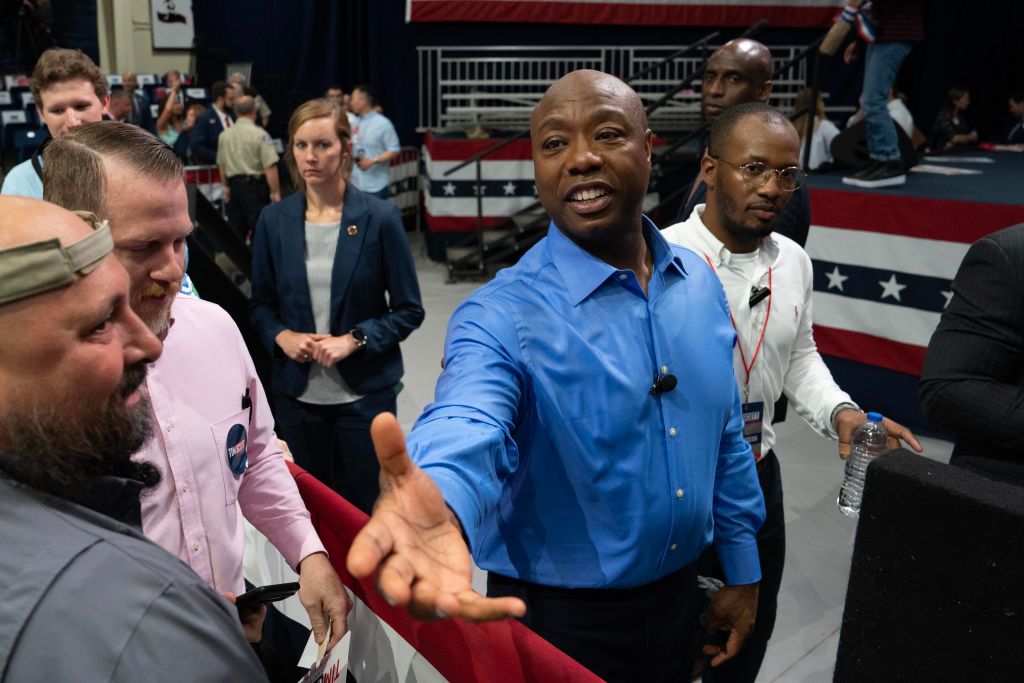It’s official. South Carolina Sen. Tim Scott is running for president.
The first thing you should know is that Scott is one of the nicest guys in Washington. Capitol Hill Republicans and just about anybody who knows him like him. Sincerely patriotic and devoutly Christian, Scott is most comfortable preaching, but he manages to avoid being preachy.
He does this mostly by leaning heavily on his own autobiography as a way to celebrate traditional values and show his gratitude for a country that made it possible for the grandson of a Jim Crow-era cotton farmer to become a United States senator—and possibly president. If you haven’t heard him tell these stories, you will, particularly if you live in any of the early primary states.
Scott will do his best to convince Republican primary voters that he deserves their vote. The better question is whether many of those voters deserve him.
In 2016, the GOP primaries had a belling-the-cat problem. In this parable, it’s in the interest of all the mice for someone to put a bell around the cat’s neck, but it’s not in the interest of any individual mouse to be the one to do it. For months after Donald Trump came down the Trump Tower escalator in June 2015, Republican contenders spent time and money destroying each other in the hope that someone else would take care of Trump and they’d reap the benefits.
There’s a lot of déjà vu in conservative circles, with people worrying about a replay of 2016. But it’s a different cat now.
Trump is not an insurgent, he’s the frontrunner. Convincing voters that a Trump presidency would be a disaster was possible in 2016. Convincing them he’d lose to Hillary Clinton was plausible. (Trump ended up picking the lock on the Electoral College even though he received a smaller share of the vote in 2016 than Romney had in 2012.)
But such hypotheticals don’t work anymore. Trump won in 2016, and he’s even convinced a lot of people that he won in 2020. His biggest fans didn’t think his presidency was a disaster; they actually think he made America great for a brief shining moment. And even Trump’s less committed fans don’t like it when Republicans criticize him. They have no problem with Trump slanderously comparing his opponents to child molesters or pedophiles, but criticizing Trump is off-limits.
This is the dilemma his opponents face. When Nikki Haley, the former South Carolina governor, announced she was running for president, she said, “I don’t put up with bullies. And when you kick back, it hurts them more if you’re wearing heels.” But when asked about a civil jury verdict holding Trump guilty of sexual abuse, her response was “I’m not going to get into that.”
The point isn’t that Haley and all the others, save for former New Jersey Gov. Chris Christie, who relishes a fight, are cowards for not going after Trump. They’d all throw the kitchen sink at Trump if they thought it’d work. But after years of institutionalized cowardice with regard to Trump, the Republican Party now has a sizable number of voters who like the worst stuff about Trump. They want the entertainment, the policy stuff is incidental. They enjoy watching Trump take the low road, and even those voters who might wince at some of Trump’s antics, still recoil at anyone making hay of it. Voter miseducation is real.
I’m not saying all of Trump’s most loyal voters are bad or deplorable people. But what a lot of them want from politics is bad and deplorable. Tim Scott is too good for these voters because he’s a good guy.
Ron DeSantis, Florida’s governor, is too good in another way. He’s betting that enough Republican voters want Trumpian policies without the drama and the “culture of losing” that has cost the GOP dearly in every election since 2018. DeSantis isn’t heartwarming and emotionally reassuring the way Scott is. He’s tough and ideologically reassuring. From a conservative and partisan perspective, he’s been wildly successful as governor. But for voters who thought Trump’s drama was a feature, not a bug, DeSantis’ stolidness is a poor substitute for Trump’s self-indulgent chaos.
What Scott, DeSantis, Haley and the rest need are primary voters who think the party should stand for something more than a cult of personality, and that the presidency is more than a tool for self-aggrandizement and retribution.
Unless they know where to find a bunch of new such voters, they’re going to have to start reeducating the ones they have. And it’s getting late.







Please note that we at The Dispatch hold ourselves, our work, and our commenters to a higher standard than other places on the internet. We welcome comments that foster genuine debate or discussion—including comments critical of us or our work—but responses that include ad hominem attacks on fellow Dispatch members or are intended to stoke fear and anger may be moderated.
With your membership, you only have the ability to comment on The Morning Dispatch articles. Consider upgrading to join the conversation everywhere.